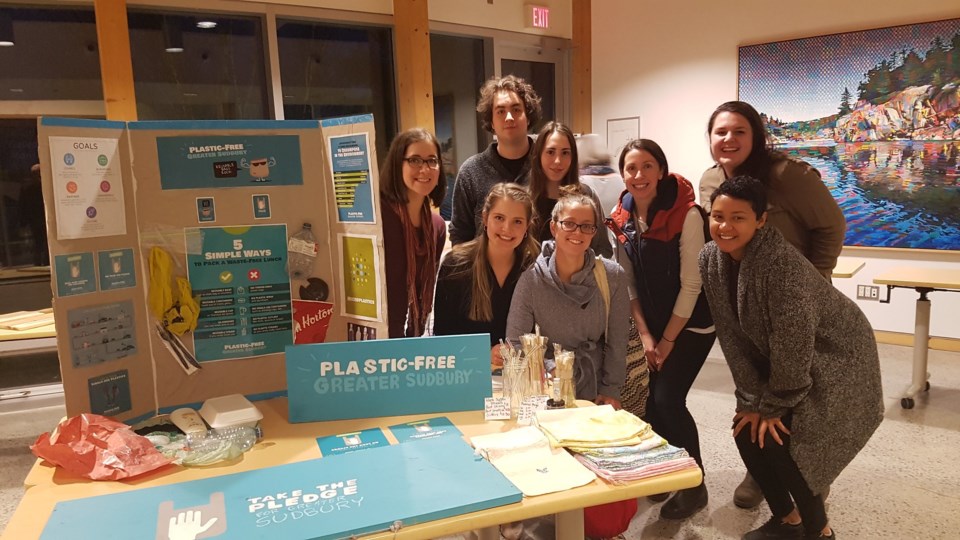In 2019, 257 volunteers helped Junction Creek Stewardship Committee and Plastic Free Greater Sudbury remove 170 bags of garbage from Junction Creek, including 68,723 pieces of single-use plastic.
We need to reduce the amount of waste we produce, and we can do so in four ways: reduce consumption, repair and re-use items, share resources, and choose items with less waste.
Liz Anawati, owner of The Nickel Refillery, was already thinking about waste when she was expecting her first child. Her concerns grew with the amount of packaging and single-use baby items coming into her home.
“People have become accustomed to a life filled with disposable items,” she notes. “People buy things thinking the item will fill a need, make life easier, or bring happiness, or sometimes just because they are available, appealing, and inexpensive.”
The environmental impact is hidden. Packaging and single-use items go to the curb and are no longer our concern. Anawati suggests we ask ourselves how the things we buy are produced, by whom, under what conditions, how far they have to travel to get to us, and where they’ll end up when we’re done with them. The answers reveal the environmental and human cost of items, and we often find we can make do with fewer things, lighten our footprint, and find joy in doing so.
Another approach to reducing waste is to repair items instead of throwing them out, and to think about how something we already own can meet a new need, saving us an additional purchase. What we think of as ‘waste’ is often a valuable resource.
Scorched pots, old boots, and suitcases can become planters; broken dishes can be used to create decorative mosaics; and old sheets and duvet covers can find new life as rags, pillow stuffing, or clothing.There are numerous on-line resources for repurposing just about anything, such as our local Sudbury Textile Recycling Group.
Almost everyone owns an item or two used only occasionally. For things like lawnmowers, gardening tools, canning equipment, or camping gear, it isn’t necessary for every household to have one of their own. What if you shared resources with a neighbour or group of friends, or worked out exchanges such as borrowing a tool for an afternoon of free childcare or a loaf of your famous banana bread? Swaps can be a fun, free way to try out new clothes, books or toys, or give away things we no longer need. Many community organizations take donations of items, to get them to someone who needs them.
When we do need to buy something, we can make waste-free choices. Items produced closer to home using locally sourced materials and sold without extraneous wrappings or in packaging that is reusable or biodegradable will reduce our need for landfill sites and keep our city and waterways cleaner. Buying local keeps our money in the local economy rather than dispersing it to far away businesses. Buying items that last, rather than wear out quickly, is another important way to reduce waste.
Reducing waste has many benefits and one of them is reducing our carbon footprint. Greater Sudbury’s Community Energy and Emissions Plan aims for 90% of our waste to be diverted from the landfill by 2050. This is similar to provincial goals, supported by shifting responsibility from the consumer to the producer.
Everything is interconnected. When we stop to ask ourselves, “how is what I am buying hurting or helping the earth?” we’re also asking “how is what I am buying making this world a better, safer, and healthier place for ourselves and the people who matter most to us?”
Making sure those green and healthy choices are affordable and accessible to everyone is an integral part of reducing our waste, and our carbon footprint, as a community. Policies that reduce waste at the source and support a circular economy make ‘zero waste’ the norm, making our lives more sustainable and more affordable.
Sharon Roy is a guiding member of the Coalition for a Liveable Sudbury. Coalition for a Liveable Sudbury is a grassroots group of citizens and community groups who share a vision of Sudbury as a green, healthy and engaged community.
For additional information on a net zero future for Greater Sudbury, see https://www.liveablesudbury.org/net_zero_sudbury.
